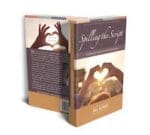Let’s take a closer look at this dualistic way of thinking, because if we understand it, we have a better chance of not becoming caught in it. Duality is the condition of opposites wherein white comes with black, good comes with bad, and yes, pleasure comes with pain. But of course duality is not the whole game; that would be unity. We came from the Oneness, we are part of the Oneness, and we are heading back to the Oneness. For now, though, we are stuck here in the Twoness.
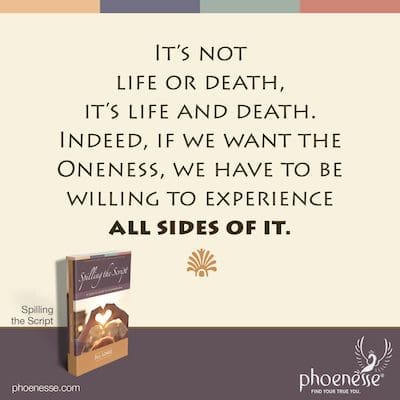
We stumble into duality when we find ourselves caught in some trap with two equally unappealing options, a “damned if you do, damned if you don’t” conundrum. Here, opposites are identical only in their ugliness. An example might be when we find ourselves stuck in a bad relationship: if I stay, I will be lonely and feel worthless; if I go, I will be alone and feel worthless.
It’s our own wrong thinking that leads us down dead-end roads in life.
We get snagged up in such illusions because they dovetail into a hidden, incorrect belief that’s become buried in our unconscious, like “I don’t matter.” It’s our own wrong thinking that leads us down dead-end roads in life.
So just know this: when we are caught in an either/or duality, we are not in truth. The only way out is to pray to know the greater truth, because prayer is the way for the split-off ego to contact the unified self—our divine center filled with infinite wisdom, love and courage.
But in that moment, it will seem like the hardest thing to ask: “What is the truth of the matter?” The duality-drenched ego has gotten locked in a life-or-death struggle to be right—where being wrong feels like death—and it can’t find a way out.
“This time,” we think, “I can win.” But we can’t, because we keep on attracting people and situations that match our hidden wrong conclusions. If we pray deeply, however, greater truth will surface. Knock and the door will always open. It is when we become more intent on the truth than on being right that we begin to transcend duality.
“We can’t solve problems by using the same kind of thinking we used when we created them.”
– Albert Einstein
From here, going deeper into the next layer of duality, we’ll find that both unsatisfactory choices actually lead to one half of a bigger duality. For example, “I only matter when I’m in a relationship. I feel worthless when I am alone.” It is our striving toward the “good half” with an equally strong desire to flee the “bad half” that locks us further into a no-win situation. Because the good half isn’t in truth, it’s just what we’re facing as we’re running from the bad. There’s no escape on this level.
So now we are truly at the doorstep of death, and our work must be to finally learn to die. In a multitude of little ways, every day, we need to die by letting go of whatever we hope will save us from pain. We must die into feeling we don’t matter, if that’s our deep-down belief. Only then can we surface and claim the truth: “I matter, whether I am with someone or alone.”
We only want pleasure and we’ll fight like the devil to not feel our hurts, freezing ourselves into stuckness.
The thing about living in this land of duality is that whenever we strive for a certain desired goal, it brings with it, at least to some degree, an undesired one. Because black comes with white, dark comes with light, and pain comes with pleasure. Yet on the unitive plane, neither side is thinkable without the other.
This is where that “all is one” notion of unity comes in. But it’s not life or death, it’s life and death. Indeed, if we want the Oneness, we have to be willing to experience all sides of it. And that means rolling with the inherent pains of life.
All our defenses and coping mechanisms have roots in the dualistic notion that pain must be avoided at all costs—or we’ll just die. We only want pleasure and we’ll fight like the devil to not feel our hurts, freezing ourselves into stuckness.
The truth is, feeling pain won’t kill us. What’s more, when we release painful feelings, we open up. Our frozen hearts melt allowing us to feel and flow again, so we can experience pleasure, creativity and peace. This is the doorway that leads to a life of freedom, connection and joy. Truth be known, it doesn’t actually hurt more to heal our pain than to hide it, and it’s by stepping through the doors of duality that we find love.
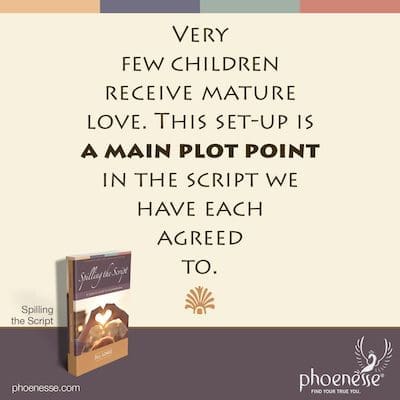
A duality gets created when the child does not receive mature love. And note, given our current state of development and the way parents are chosen for each incarnation, very few children receive mature love. This is an important “set up” to understand. It is a main plot point in the script we have each, on another level of reality, agreed to.
Further, in the universal duality created by the child’s demand for exclusive love, the child can’t win. The child will be unconsciously jealous of siblings and both parents, feeling rejected and excluded. The duality is that the child wants the exclusive love of the parents, but the child suffers more if the parents don’t love each other or the siblings. This “not winning” reinforces to the child that it is not loved.
Every day, we can find places in us where we are hoping to avoid a buried pain.
The resulting opposing but equally painful thoughts might be: “This is the way it is supposed to be” versus “This is my lot in life and it is like no one else’s.” This will lead the child to draw negative conclusions about the self and/or life. Yet neither statement is in truth.
The truth is that parents can love more than one person, albeit imperfectly. The reality is that the child doesn’t know why it feels unloved and unhappy, or the child may believe it is happy because it got some love. Either way, painful feelings of being unloved and unlovable will get cut off—because the child believes it will die from feeling this pain—and trapped inside. All this must be surfaced and explored.
This is where we must begin to do the hard work of dying. Every day, we can find places in us where we are hoping to avoid a buried pain. We die to this illusion by going through our painful feelings and discovering that this doesn’t kill us. We must also die to our immature demands to have our way right now, and to clinging to anything or anyone we believe has the power to save us. The ego must learn to “let go and let God,” and in doing so, discover a far vaster resource of wisdom and strength.
Often, in our frustration, we will turn towards the very thing we fear, embracing the negative and resigning ourselves to feelings of hopelessness. In this case, we will often choose a substitute for satisfaction, such as material possessions or even overzealous religious convictions, which we then cling to in hopes they will bring us the happiness we long for.
If we can keep our hearts open and feel all our feelings—including the uncomfortable ones—what we discover is that we feel better after we release the cramped, rigid holding of painful feelings. We are softened and opened up by a “good cry.” In this way, we get a glimpse of how pain and pleasure are one.
It is the same with giving and receiving. They are a pair that cannot be separated. So if we say we are good at giving but not receiving, we deceive ourselves. We cannot really give freely if we are not able to receive. And if we are stuck in negative intention and won’t give, we cannot receive the best life has to offer.
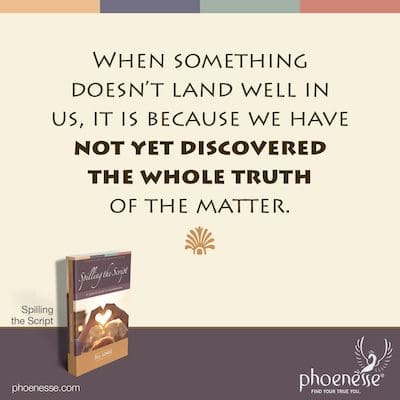
Truth is a spectrum. And until we see the whole spectrum of truth regarding anything, we may see something as being true when we in fact don’t have the full truth. We can liken our window on truth to the experience of looking out one side of a train. Through that window, we see a certain landscape. But it is quite possible that if we look out the window on the other side of the train, we will see something completely different. And yet it’s all connected.
So in dualistic thinking, the world is divided into black and white. Reality, on the other hand, can combine a bit of both: Sometimes they’re going to like us, and sometimes they’re not. For the mature adult, this is not the end of the world.
Further, on the unitive plane, we discover that we are both right and wrong, just like everyone else. What’s more, even opposites can both be right.
“The opposite of a fact is falsehood, but the opposite of one profound truth may very well be another profound truth.”
– Niels Bohr
Until we know the greater truth of any matter, we need to remain curious and be willing to widen our perspective. When something doesn’t land well in us, it is because we have not yet discovered the whole truth of the matter. For when that happens, energy is released and we will feel enlivened and settled by the truth.
To accept that life, with all its challenges, can also be meaningful and beautiful, requires courage. Maturity results from this ability to hold such a greater level of awareness.
Stages of Development
Immature Inner Child
- Caught in duality
- Images create Emotional Reactions
- Lives in a trance
- Automatic reflex
- Vicious Circles
- Either/Or situations with No Way Out
Dissolves into Mature Adult
- Healthy ego accesses Higher Self to heal inner child
- Healthy ego asks for God’s guidance
- Both/And connections with others
Dissolves into Unitive Consciousness
- Connected with Higher Self, or Christ Consciousness
- Plugged into guidance and intuition
- Fully in the body and in harmony: energized, awake, peaceful
- Present in the Now
- Trusts
- Realizes “God is in me”
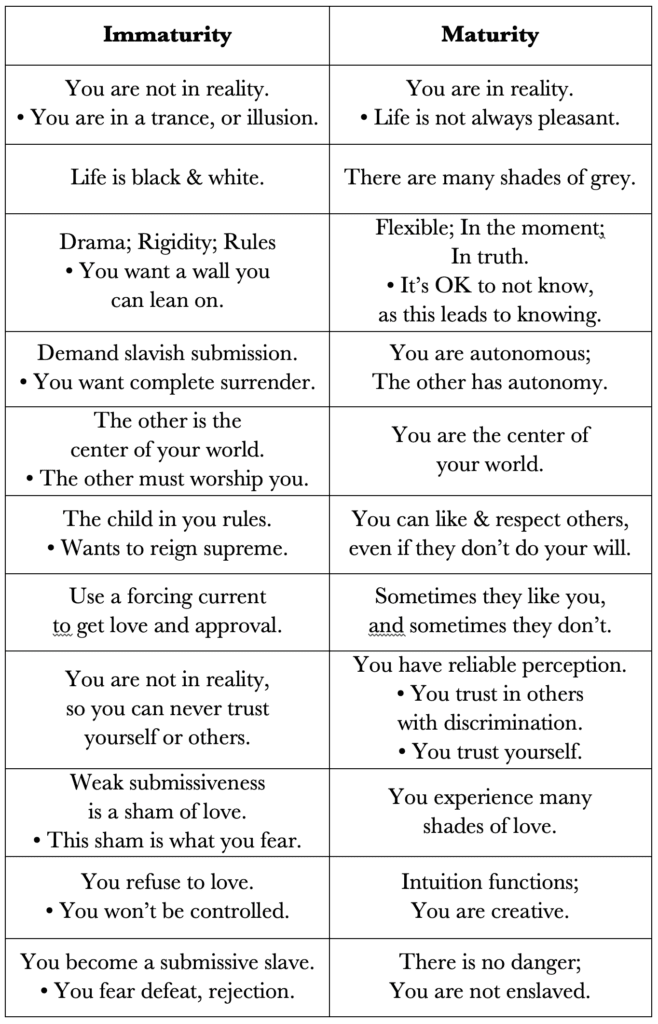
Learn more in Gems, Chapter 14: How to Visualize Living in a State of Unity, and Chapter 15: Surrendering to the Double-Sided Nature of Duality.
Return to Spilling the Script Contents


